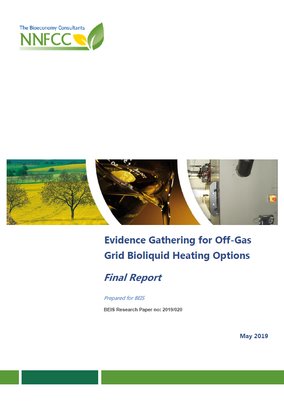 Highlights
Highlights
This report discusses:
- The decarbonisation challenge presented by the UK's off-grid-heated homes
- The technical barriers to heating these homes with bioliquid blends
- The costs of converting from fossil-based to biobased off-grid heating
Reasons
to read
- Discover the available options for off-grid bioenergy heating
- Learn about the challenges facing the off-grid heating sector as it looks to decarbonise
Number
of pages: 101
Accessibility: This item is freely available
Summary
The decarbonisation of space and water heating is one of the greatest challenges within the UK energy landscape. Domestic properties that are off the gas grid emit over 7 million tonnes of greenhouse gases (CO2-equivalent) to the atmosphere each year and present a unique opportunity to implement renewable heating technologies and reduce dependency on fossil fuels.
Bioliquids are liquid fuels manufactured from a renewable biological source such as virgin or used vegetable oils, woody biomass and energy crops. The key bioliquids of interest here are virgin vegetable oil, used cooking oil, biodiesel, BioLPG (biopropane) and blends of biodiesel and fossil fuels. Despite there being an established market and support mechanism for biofuels in the transport sector, bioliquids used for heat in boilers are not currently eligible under the RHI.
The work presented here is the result of an evidence gathering exercise on the potential of bioliquids for use as heating fuels in off-gas grid properties. The work draws upon published literature and policy documents, structured stakeholder interviews, a field-based survey, and a deployment model in order to better understand the costs, constraints and impacts of using neat bioliquids or blends.
You may also be interested in: